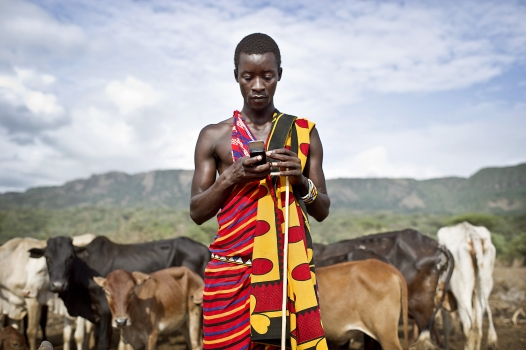In this article, International Development and Humanitarian Emergencies MSc candidate Boluwatife Ajibola presents critical reflections on some issues raised at a panel discussion he organised on 11 June 2021 with the support of LSE Department of International Development. The event was titled ‘Technologies and contemporary protest dynamics in Africa: Lessons for the future of collective action’ and you can watch the event recording here.
From hashtags to the streets
A wave of civic consciousness and civil disobedience seems to have accompanied the Covid-19 pandemic to Africa in the year 2020. Perhaps it is worth designating the year as one with multiple unprecedented dilemmas. The continent witnessed a rise in youth mobilisations against varied forms of socio-economic deprivations and wide angst against social injustices – injustices newly tagged as ‘other pandemics’. Protests on the continent were marked by massive uptake of digital technologies – tools characterised by immediacy and other peculiar privileges. Some of these popular movements in Africa included the #stopGBV movement against gender-based violence in South Africa, the #ZimbabweanLivesMatter movement against rights violations, the #ShutItAllDown movement against gender-based violence in Namibia, the #AmharaGenocide protests against violence in Ethiopia, and the #EndSARS movement against police brutality in Nigeria, among others.
Young Africans demonstrated what differences their uptake of technologies could make in communicating shared grievances, intercepting State routines of work, and arresting global attentiveness. The spark and progression of these demonstrations introduces new dynamics into contemporary social movements in a world where disjointed publics connect for seemingly mutual interests. Conversations around these movements provide new blueprints for the future of collective bargaining and action.
The panel session which held on 11 June 2021 sought to unpack rhythms of protest machinations and to make predictions on social movements in Africa given the new and evolving privileges of technologies, and how they influence the quest for socio-economic development in Africa. Panellists exchanged insights, drawing on their practical mobilisation and activism experiences in Africa, transcending issues on the positives and negatives of technology use, new mechanics of support galvanising, the internationalisation of youth struggles and the roles of the state, inter alia, with most inference drawn from Nigeria’s #EndSARS protests. However, the issues discussed prompt further consideration of the prospects for sustained consciousness and activism after street protests, dynamics of unintended exclusions and the galvanising of communities in communities without, or with limited, tech options. In this piece, I submit my critical reflections on some of the issues.
Crossed wires and disinformation
The potential of technologies to transform the works of social actors and organisers is undoubted. While digitised tools, by design, can enhance mobilisation processes, the spread of messaging and simultaneous engagement of stakeholders during demonstrations, protesters themselves possess the latitude to make sense of those tools. As has been witnessed in recent times, on physical and virtual demonstration sites, protesters adapt technologies to the fluid dynamics of the protest, and to their needs in the moment. For instance, in the case of the #EndSARS protests in Nigeria, techies and other skilled citizens developed new tools to expedite the impact and popularity of the protest as well as desired outcomes. However, it is not only protest actors appropriating these tools for causes on the spectrum of outcomes held legitimate by the movement. Agents of discord can also utilise them, and these masked elements employ the same tools in frustrating civil and legitimate claims of the protest.’ They peddle false information, spread propaganda, and sponsor contentions between multi-sited protest leaders.
What, broadly, accounts for these? Perhaps the design of some digital platforms is not perfectly suited to some protest rhythms and country dynamics. Drawing on my reflections on the seeming dysfunctionalities of digital tools, I assume that same tools and platforms that propel a movement from inception to further stages could be seized to discredit the movement and even reverse the prospects of achieving its set goals. During the #EndSARS protest, some posts containing words like ‘#EndSARS’, ‘#EndPoliceBrutality’ and other related hashtags, including pictures, were reported to have been incorrectly flagged by Facebook and Instagram as fake news. This was also reported to have prompted anti-fake news campaigns, propaganda and other moves by agencies of the Nigerian government to stigmatise the agenda of protesters.
The vision of tomorrow
The inability of protesters or their leaders to determine the course of events, given the decentralising privileges of social media for instance, and the diffusion of command among mobile phone users, sometimes threatens the prospects of attaining gratifying endpoints. Whose call? It is important that the collective performing of leadership during contemporary movements embeds elements of order and control. I believe the order and control should stem, primarily, from what Popovic and Miller call the ‘vision of tomorrow’.
A clear understanding of the ‘vision of tomorrow’ shapes the agenda of the movement, its priorities as well as the mix of viable tactics to influence the targeted locus of power. One of the panellists in the discussion on 11 June, for example, queried the failure of the #EndSARS protest organisers to create messaging that cut across multiple layers in the Nigerian society. Although there was a demography that the protest focused on, it failed to adequately educate the unconcerned or peripheral others, some of whom were vulnerable to manipulations and were easily persuaded against the #EndSARS movement.
The digital divide in certain nations also deepens these exclusionary norms, as only those who are digitally connected can relate to the vision. Thus, the vision of tomorrow should not only be communicated to key demographics, as this passively excludes others whose ignorance could open windows to attacks. Even online, a clear and cross-cutting vision is much more likely to mobilise a diverse group outnumbering and overpowering agents of division. Additionally, the communication routes and frame of a message are as important as the message itself. Not until the gay rights movements in the US began to frame issues in ways that appealed to straight people did things begin to change. This is a key lesson for movements in Africa.
The world at our fingertips
Furthermore, referring to the BLM movement, a panellist asked, ‘is it that more black people are being killed these days?’ To him, No! The reality is that more black people now have mobile phones with video recording functions, hence they can more easily supply evidence to back reported claims of injustice. Relatedly, given the spate of protests and demonstrations, is it that injustices and civic abuses are in recent times increasingly perpetuated by governments than they were decades ago? The diffusion of mobile phones and the availability of the internet makes it easy for people to track, report and query state wrongdoing. Interestingly, mobile phones can present ideals apparent in other settings of the world. With netizens being aware of how fundamental human rights are upheld in some nations, they are incentivised to express their agitations against state actions that breach international law.
This also connects to the internationalisation of struggles. An experience of the ‘ideal’ by those that reside in free nations across the world can stir expressions of anger against governments of other nations that defy democratic standards, as well as expressions of solidarity with those who confront those governments and their injustices. Nowadays, these expressions cannot be divorced from the influence of technologies, and how their uptake by protesters helps to internationalise their struggles. During the #ENDSARS protest, Nigerians in the Diaspora sustained the protest momentum online and offline even after physical protests had ceased in Nigeria. Thus, during protests, communication technologies do not only enhance the internationalisation of social and legal standards, but also mobilise international allies behind the cause.
Lessons for the future
In conclusion, protesters and their leaders should note that regardless of the advantages technologies present to their movements, their demonstration (either online or offline) ‘will not last forever’. For several reasons, a physical demonstration or protest is likely to lose moment and come to an end, even if demands are not met. Online also, unfolding events are likely to displace the protest hashtags from top trends, further undermining the importance of the movement and change sought. Given these, protesters need to consider alternatives to sustaining the momentum of their movement, and more importantly, the translation of their fury to active political participation.
The views expressed in this post are those of the author and in no way reflect those of the International Development LSE blog or the London School of Economics and Political Science. Photo credit: Kaizenify on Wikimedia Commons.






Really an amazing and informative blog thanks for letting us know the situation people are facing there.
This is highly educative.